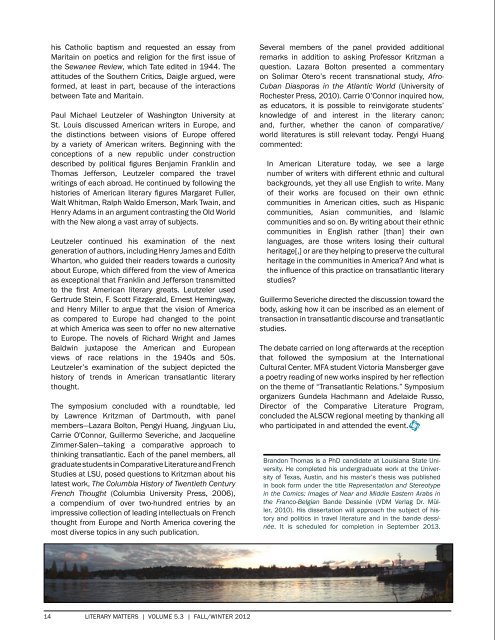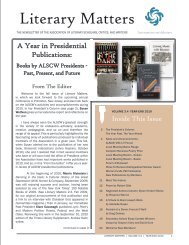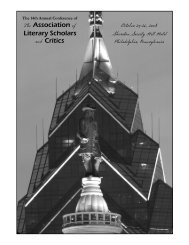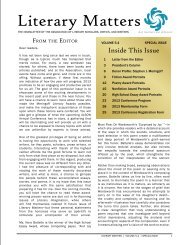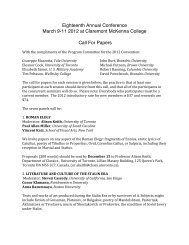Literary Matters 5.3 - Association of Literary Scholars, Critics, and ...
Literary Matters 5.3 - Association of Literary Scholars, Critics, and ...
Literary Matters 5.3 - Association of Literary Scholars, Critics, and ...
Create successful ePaper yourself
Turn your PDF publications into a flip-book with our unique Google optimized e-Paper software.
his Catholic baptism <strong>and</strong> requested an essay fromMaritain on poetics <strong>and</strong> religion for the first issue <strong>of</strong>the Sewanee Review, which Tate edited in 1944. Theattitudes <strong>of</strong> the Southern <strong>Critics</strong>, Daigle argued, wereformed, at least in part, because <strong>of</strong> the interactionsbetween Tate <strong>and</strong> Maritain.Paul Michael Leutzeler <strong>of</strong> Washington University atSt. Louis discussed American writers in Europe, <strong>and</strong>the distinctions between visions <strong>of</strong> Europe <strong>of</strong>feredby a variety <strong>of</strong> American writers. Beginning with theconceptions <strong>of</strong> a new republic under constructiondescribed by political figures Benjamin Franklin <strong>and</strong>Thomas Jefferson, Leutzeler compared the travelwritings <strong>of</strong> each abroad. He continued by following thehistories <strong>of</strong> American literary figures Margaret Fuller,Walt Whitman, Ralph Waldo Emerson, Mark Twain, <strong>and</strong>Henry Adams in an argument contrasting the Old Worldwith the New along a vast array <strong>of</strong> subjects.Leutzeler continued his examination <strong>of</strong> the nextgeneration <strong>of</strong> authors, including Henry James <strong>and</strong> EdithWharton, who guided their readers towards a curiosityabout Europe, which differed from the view <strong>of</strong> Americaas exceptional that Franklin <strong>and</strong> Jefferson transmittedto the first American literary greats. Leutzeler usedGertrude Stein, F. Scott Fitzgerald, Ernest Hemingway,<strong>and</strong> Henry Miller to argue that the vision <strong>of</strong> Americaas compared to Europe had changed to the pointat which America was seen to <strong>of</strong>fer no new alternativeto Europe. The novels <strong>of</strong> Richard Wright <strong>and</strong> JamesBaldwin juxtapose the American <strong>and</strong> Europeanviews <strong>of</strong> race relations in the 1940s <strong>and</strong> 50s.Leutzeler’s examination <strong>of</strong> the subject depicted thehistory <strong>of</strong> trends in American transatlantic literarythought.The symposium concluded with a roundtable, ledby Lawrence Kritzman <strong>of</strong> Dartmouth, with panelmembers—Lazara Bolton, Pengyi Huang, Jingyuan Liu,Carrie O'Connor, Guillermo Severiche, <strong>and</strong> JacquelineZimmer-Salen—taking a comparative approach tothinking transatlantic. Each <strong>of</strong> the panel members, allgraduate students in Comparative Literature <strong>and</strong> FrenchStudies at LSU, posed questions to Kritzman about hislatest work, The Columbia History <strong>of</strong> Twentieth CenturyFrench Thought (Columbia University Press, 2006),a compendium <strong>of</strong> over two-hundred entries by animpressive collection <strong>of</strong> leading intellectuals on Frenchthought from Europe <strong>and</strong> North America covering themost diverse topics in any such publication.Several members <strong>of</strong> the panel provided additionalremarks in addition to asking Pr<strong>of</strong>essor Kritzman aquestion. Lazara Bolton presented a commentaryon Solimar Otero’s recent transnational study, Afro-Cuban Diasporas in the Atlantic World (University <strong>of</strong>Rochester Press, 2010). Carrie O’Connor inquired how,as educators, it is possible to reinvigorate students’knowledge <strong>of</strong> <strong>and</strong> interest in the literary canon;<strong>and</strong>, further, whether the canon <strong>of</strong> comparative/world literatures is still relevant today. Pengyi Huangcommented:In American Literature today, we see a largenumber <strong>of</strong> writers with different ethnic <strong>and</strong> culturalbackgrounds, yet they all use English to write. Many<strong>of</strong> their works are focused on their own ethniccommunities in American cities, such as Hispaniccommunities, Asian communities, <strong>and</strong> Islamiccommunities <strong>and</strong> so on. By writing about their ethniccommunities in English rather [than] their ownlanguages, are those writers losing their culturalheritage[,] or are they helping to preserve the culturalheritage in the communities in America? And what isthe influence <strong>of</strong> this practice on transatlantic literarystudies?Guillermo Severiche directed the discussion toward thebody, asking how it can be inscribed as an element <strong>of</strong>transaction in transatlantic discourse <strong>and</strong> transatlanticstudies.The debate carried on long afterwards at the receptionthat followed the symposium at the InternationalCultural Center. MFA student Victoria Mansberger gavea poetry reading <strong>of</strong> new works inspired by her reflectionon the theme <strong>of</strong> “Transatlantic Relations.” Symposiumorganizers Gundela Hachmann <strong>and</strong> Adelaide Russo,Director <strong>of</strong> the Comparative Literature Program,concluded the ALSCW regional meeting by thanking allwho participated in <strong>and</strong> attended the event. aBr<strong>and</strong>on Thomas is a PhD c<strong>and</strong>idate at Louisiana State University.He completed his undergraduate work at the University<strong>of</strong> Texas, Austin, <strong>and</strong> his master’s thesis was publishedin book form under the title Representation <strong>and</strong> Stereotypein the Comics: Images <strong>of</strong> Near <strong>and</strong> Middle Eastern Arabs inthe Franco-Belgian B<strong>and</strong>e Dessinée (VDM Verlag Dr. Müller,2010). His dissertation will approach the subject <strong>of</strong> history<strong>and</strong> politics in travel literature <strong>and</strong> in the b<strong>and</strong>e dessinée.It is scheduled for completion in September 2013.14 LITERARY MATTERS | VOLUME <strong>5.3</strong> | FaLL/WINTER 2012


